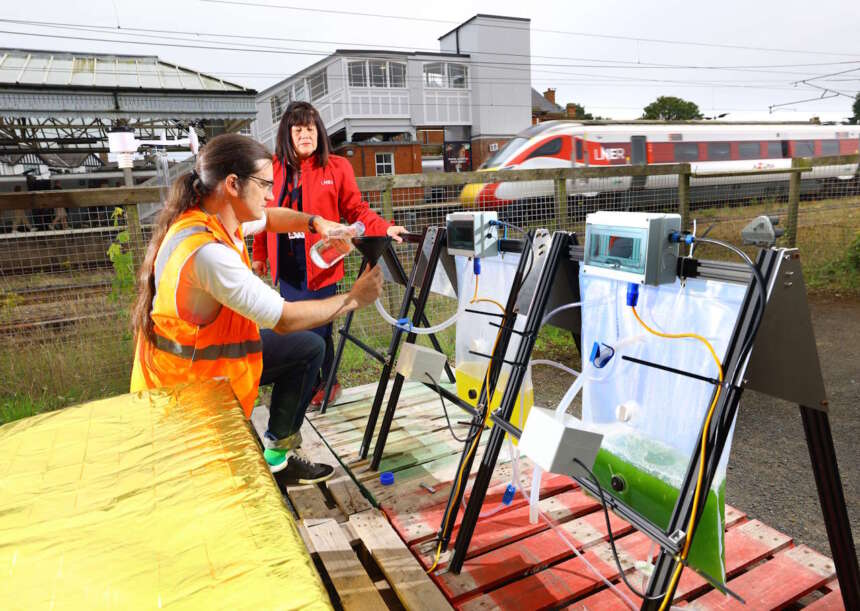A railway company and a science and technology start-up have teamed up to run a pilot project aimed at reducing carbon around stations.
London North Eastern Railway (LNER) is working with Algacraft to undertake a project which will help it meets its decarbonisation commitments.
The project has already undergone an initial trial which tested the feasibility of using microalgae bioreactors in locations around stations. The plant is known to be up to 400 times more effective at capturing carbon dioxide than trees, when area and density is taken into consideration. By adopting this method of carbon capture, it was necessary to demonstrate that microalgae can be successfully grown outdoors in the UK without resorting to temperature control. There also needed to be proof that the method could capture carbon on a small scale. The five-month trial concluded that these objectives were clearly possible.
A second phase of testing will now be undertaken by the two companies and will take place at Berwick-upon-Tweed station, making use of disused land adjacent to the railway. This phase will involve tests to see if the bioreactors which have been developed so far can be scaled up in order to provide more efficient carbon capture. An individual bioreactor will take up about as much land as is needed for two car parking spaces. Space adjacent to railways is an ideal option for possibly installing bioreactors in densely-populated areas and at stations.
This project forms part of FutureLabs, LNER's flagship accelerator programme. The programme aims to bring innovative concepts to the railway industry to address key challenges. One of the central themes is the need to build a more sustainable railway. LNER is committed to having a minimum of two carbon-neutral stations by 2025 and to be wholly net zero by 2045.
LNER and Algacraft plan to optimise the system and, by next year, be able to demonstrate that on-site microalgae production can capture more CO2 than other plant-based solutions which are currently available.
Danny Gonzalez, Chief Digital and Innovation Officer at LNER, said: “The LNER FutureLabs programme has brought forward brilliant innovations and this project with Algacraft is no exception. We strongly believe that technology holds the key to discovering novel ways to reduce our impact on the planet, and the early success of this first trial phase shows real promise.
“One of the key pillars of LNER's wider innovation strategy is to take on and trial new projects in the early stages, driving them forward and quickly strengthening our knowledge of how it can operate within a rail industry setting. Given we have reached this first milestone, we look forward to developing our research further with Algacraft and sharing our learnings more widely with the rail sector and beyond.”

Not all their trains are electric as not all the lines where they travel are electrified, especially north of Edinburgh.
Since LNER trains are electric I’m not clear what carbon dioxide the company needs to capture to make them “carbon free”.
Maybe they’re acknowledging the fact that at least half the electricity they use is generated from natural gas – and that this is likely to remain the case for the forseable future, no matter how many wind turbines are built?